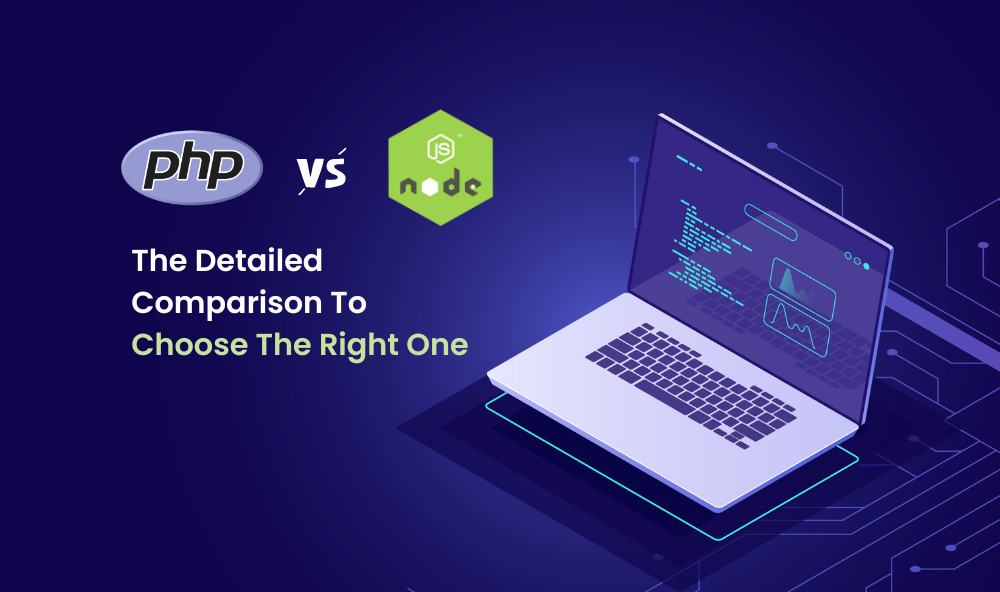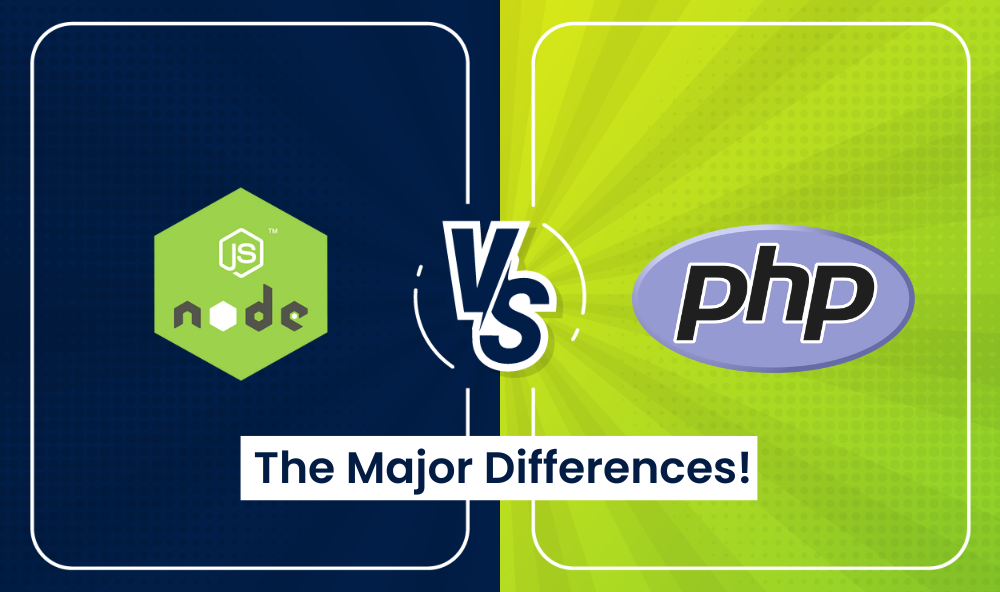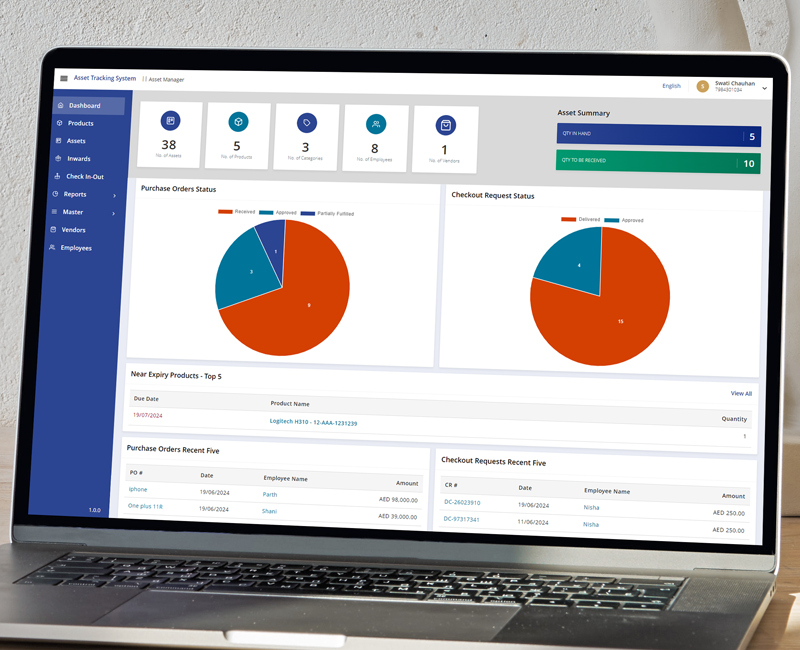
Both PHP and Node.js are viable solutions for back-end development. In the developer community, there is disagreement over which of them is the best, just like with other platforms.
Since PHP is the elder of the two, it obviously has a broader community and more significant projects. While Nodejs is more recent, it has nonetheless succeeded in rapidly expanding its user base.
There’s only one significant decision to make: Should you use the old but still reliable and effective PHP or the brand-new, powerful, and quick Node.js for your upcoming project?
Both are, in fact, fantastic choices. To decide which one is best for your upcoming project in between Node Js V/s PHP, you must first get to know each of them.
What is Nodejs?
Node.js is not a JavaScript framework or a programming language. Node.js is more akin to a setting where JavaScript can be curled to function as a server-side scripting tool.
Node.js is a single-threaded, open-source, cross-platform runtime environment for creating connectivity and server-side applications that are quick to implement and scalable. It uses the Google V8 JavaScript runtime engine and features an event-driven, non-blocking I/O structure. This makes it an effective and perfect tool for developing real-time applications.
Over time, Node.js has undergone significant improvement. Along with JavaScript, Node.js is also written in C and C++ programming languages. This is due to the fact that low-level C is one of the best programming languages for creating operating systems, database systems, and other system programming-related routines.
What is PHP?
In terms of technology, PHP is a synchronous programming language multithreaded blocking I/O execution. PHP is run via the processor Zend Engine on the server, in conjunction with the Nginx and Apache web servers.
The client side waits until it gets the outcomes of a script are executed without having access to the initial code, and no additional code lines are performed until the prior conclusion is obtained.
PHP is an open-source server-side javascript framework that is utilised by internet behemoths such as Wikipedia, Tumblr, and Facebook.
According to W3Tech research, PHP is utilised for data on over 77.7% of websites. Although being synchronous and requiring a central server, it comes with a number of built-in features and packages that make creating eCommerce and CMS websites relatively simple.
PHP V/s Nodejs – The major differences!

The speed
This measure describes the execution speed that both technologies have by default. A shorter development procedure and more cost-effective projects result from high terms of execution time.
Nodejs – Node.js is among the few asynchronous development platforms. This distinguishes Node.js from other technologies and gives it a benefit. It does not need to wait for one module to finish running before uploading the following since it is asynchronous. Such execution significantly minimises latency for the web app and improves the customer experience.
PHP – PHP relies on synchronicity, like the majority of other languages. This suggests that every module and function is executed in the order specified by the code. The execution of following methods or modules won’t start until the first one is finished.
PHP V/s Nodejs performance
Performance is a metric that gauges the speed at which code is run. It directly affects KPIs like page loads and seamlessness.
PHP – The ability to run PHP faster than usual is provided by certain initiatives and settings that are managed by skilled developers. The majority of server-side languages, including PHP, have a blocking approach. This means that when you ask a database for data, the request runs and completes the procedure before moving on to the next line. Additionally, you can anticipate even quicker rates using PHP 8’s JIT feature.
Nodejs – The efficiency of Node.js, however, is frequently superior to that of PHP. Node.js provides numerous advantages over PHP in terms of speed that go beyond nodejs developer competence, even though performance is also mainly a product of the knowledge and expertise of the working team.
Community
The support of the community is another factor that plays a key role in choosing the technology to use for web app development requirements. To maintain the current technology and give it an advantage over competing technologies, a community works to produce libraries and frameworks.
Nodejs – Nodejs is a relatively new technology with a developing customer base and nodejs developer community. However, Nodejs is a more recent technology with fewer users than PHP.
PHP – Because PHP is an older technology, it has a larger community than more recent technologies. When comparing the size of the communities for PHP and Nodejs, PHP comes out on top by a wide margin.
Functionality
PHP – PHP is the purest backend programming language available. Its potential development area is so constrained. Therefore, in order to construct and manage a PHP-based project, a programmer must have a solid understanding of a variety of technologies in addition to CSS and HTML.
The developers of PHP are always coming up with fresh functions and suggestions to enhance its abilities and usefulness, despite the challenges listed above.
Node JS – With no functionality segmentation, Node.js is a programming language that unifies some of the most important components into a unified, flawless package. It enables you to build a full backend model.
Additionally, JavaScript is a full-stack technology for development, meaning it can be used to build an entire online or mobile application.

Ease of use
Both Node.js and PHP have their own strengths and weaknesses in terms of ease of use.
Nodejs – Node.js is known for its fast performance and ability to handle real-time applications with its non-blocking I/O model. It uses JavaScript, a popular and widely-used language, which makes it easy for Nodejs developers who already know JavaScript to pick up Node.js.
PHP – PHP, on the other hand, has been around for a long time and has a large and established user base. It has a simpler syntax and a large number of libraries and frameworks available, making it easy to get started with web development.
Ultimately, the ease of use depends on the individual’s prior experience, skills and personal preference.
Learning curve
The learning curve for both Node.js and PHP depends on the individual’s prior programming experience and the complexity of the project they want to build.
Nodejs – If a developer has prior experience with JavaScript, picking up Node.js might be relatively easier. Node.js uses JavaScript and has a large number of libraries and packages available, which makes it easier to get started with complex projects.
PHP – PHP, on the other hand, has a simpler syntax and has been around for a long time, making it easier for beginner developers to learn and get started with web development.
Modules
Difference between Node.js and PHP when it comes to modules:
Node.js:
- Uses CommonJS modules as its standard modules system.
- Modules are executed in their own scope and have exported objects, which can be imported into other modules.
- A large number of modules are available through the npm (Node Package Manager) repository.
PHP:
- Uses include/require statements to include scripts and classes into the current scope.
- Does not have a standard modular system like CommonJS.
- Modules can be managed using the Composer package manager.
Security
In terms of security, both PHP and Node.js have some vulnerabilities, but both also have measures in place to address them.
PHP – PHP has a large community of developers who have created numerous tools and libraries to address security issues, such as SQL injection and XSS attacks.
Nodejs – Node.js also has a strong security-conscious community, and there are many npm packages available to secure applications. However, Node.js is relatively new compared to PHP and has not been battle-tested as much, meaning there may still be undiscovered vulnerabilities.
Ultimately, security is a shared responsibility between the language and the nodejs developer. No matter the language, if proper security measures are not taken, the application will be vulnerable. It is up to the developer to ensure that the application is secure by staying up to date with the latest security measures and best practices.
When to choose Nodejs?

If you’re seeking the following characteristics, Node.js can deliver the best value for your web app development:
For building SPAs
If the nodejs development company is developing a progressive single-page application, you could be using MongoDB, ExpressJS, or AngularJS. Node.js is frequently employed in conjunction with this architecture for convenience of development and best performance.
Speed & performance
When making repeated calls to the server, web applications made using Node.js typically perform better. Because of its asynchronous nature, it can be executed without blocking, which is perfect for any project that demands speed.
Real-time apps
Node.js is ideal for web apps that require real-time data capability since the data transfer velocity from the server to the client-side application is ideal.
When to choose PHP?
If your web app needs any of the following characteristics, PHP would be the leading technology for your project:
When scaling is not needed – PHP is the ideal complement to your tech stack if your goal is to give your web app a dedicated core server and not scale it across a larger number of servers.
Portability – While PHP does limit the number of servers you may connect to successfully, it also gives you excellent portability between hosts. Because of this, you can essentially migrate your web application to any server that supports databases and has Apache, IIS, or other database-supporting features.
Better content management – PHP can be used with content management systems like WordPress, Jumla, or Drupal to launch your website quickly.
To conclude
In conclusion, of choosing PHP v/s Nodejs, both these technologies have their own strengths and weaknesses, and the choice between the two depends on the specific requirements of the project.
PHP is a well-established language and is great for creating dynamic and interactive web pages, while Node.js is better suited for real-time applications and handling large amounts of data.
It is also worth mentioning that the PHP community is much larger and more mature, while Node.js is rapidly growing and evolving. Ultimately, it is up to the developer to determine which language is the best fit for their project based on their skill set, experience, and project requirements.
And if you are still confused and would like to make the right choice, reach out to our team of experts at Sufalam Technologies – the leading web app development company. They will understand your needs and offer the best possible solution.













